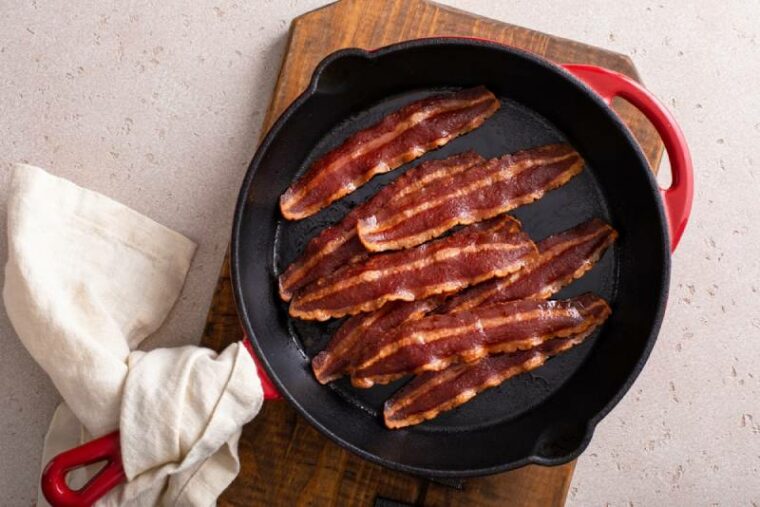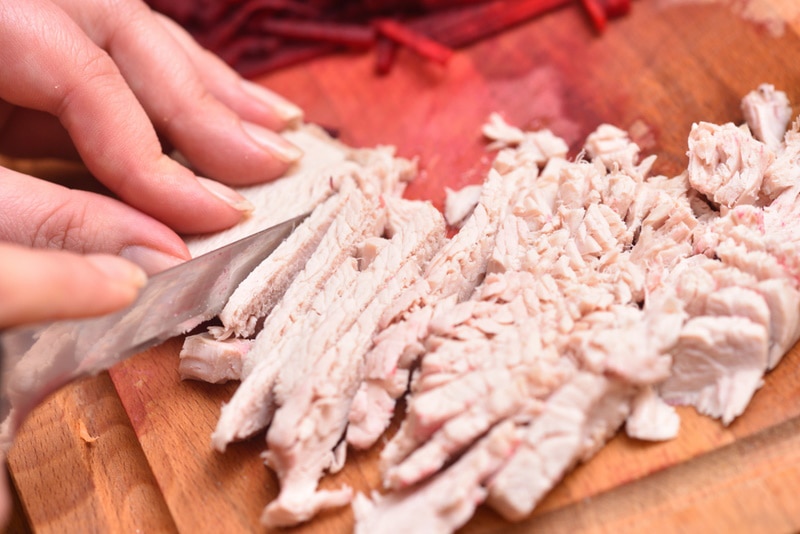
Click to Skip Ahead
Turkey is a common ingredient in many commercial dog foods. Dogs seem to find it tasty, considering how often they sit at your feet and beg during Thanksgiving dinner. Since turkey is often used in dog food, some dog owners believe that all forms of turkey are safe for their dogs; however, that is not the case, and turkey bacon is not safe for dogs. If you want to feed turkey bacon to your dog, it is one of the forms of turkey that is not safe for your pet. Turkey bacon contains significant amounts of sodium and preservatives, which are harmful to your dog.
Dangers of Salt Poisoning
The abundant sodium is one of the primary reasons that turkey bacon is not healthy for your pet. In one 14g slice of turkey bacon, there is 135 mg of salt. While salt is essential to your dog’s diet, they likely receive all their daily salt allowance from their regular commercial food. If you feed your dog salty foods on top of that, you increase their risk of high blood pressure, heart problems and very occasionally, suffering from salt toxicity.
Dogs suffering from salt toxicity may experience gastrointestinal upset (such as diarrhea and vomiting) or neurological issues, such as seizures. However, it’s not a common issue and is unlikely to occur unless you feed your pup salty treats every day and forget to give them water to drink.
Health Benefits of Turkey
Although turkey bacon is not healthy for your dog, turkey is a great source of protein. As long as you prepare it properly and offer it to your dog in appropriate proportions, turkey can be a healthy treat with lots of benefits. Some nutrients found in turkey include:
| Nutrient | Amount per 100g roasted turkey meat | Benefit |
| Protein | 29.1g | Building muscles, hormones, enzymes, energy production, growth. |
| Calcium | 13mg | Formation of bones and teeth; blood coagulation; nerve impulse transmission; muscle contraction; cell signaling |
| Phosphorus | 222mg | Skeletal structure; DNA and RNA structure; energy metabolism; locomotion; acid-base balance |
| Potassium | 239mg | Acid-base balance; nerve- impulse transmission; enzymatic reactions; transport functions |
| Sodium | 101mg | Acid-base balance; regulation of osmotic pressure; nerve impulse generation and transmission |
| Selenium | 30.7mg | Defense against oxidative damage; immune response |
| Zinc | 2.51mg | Enzyme reactions; cell replication; protein and carbohydrate metabolism; skin function; wound healing |
| Choline | 88.9mg | Used in forming cell membranes |
Feeding Turkey to Your Dog Safely
When feeding turkey to your dog, it is important that you prepare it correctly. To give turkey to your dog, follow these guidelines; cook the meat, avoid the fat, remove the bones, and never add ingredients.
Cook the Meat
Raw turkey may contain harmful bacteria, causing serious health issues for your dog. Therefore, ensure the turkey is fully cooked before feeding it to your dog. Boiling or roasting turkey is the safest way to prepare it for your pet.

Avoid the Fat
Pieces of fat or skin on the turkey are unhealthy for your dog. The high-fat content can lead to digestive upset or other issues. In the long term, regularly consuming fatty foods can lead to obesity, pancreatitis, mobility issues and heart disease.
Remove the Bones
It’s a common belief that dogs love bones, and although they may enjoy chewing on a bone, it isn’t advised that you let them do so. Chewing on bones can be dangerous, especially smaller ones like the bones of a turkey.
Never Add Ingredients
Seasoning makes a turkey taste good to humans, but for dogs, it’s a health hazard. Added ingredients can be unhealthy at best and toxic at worst. Therefore, plain-boiled or roasted turkey is the safest option for your dog.

Know How Much Turkey Your Dog Can Eat
Plain-boiled turkey can be a healthy treat for your dog, assuming that it is given in moderation. Generally, treats should only make up 10% of your dog’s daily diet, even if the treat is healthy, like turkey. The other 90% of your dog’s diet should be a well-balanced, high-quality dog food diet.
Below are typical daily feeding guidelines that you can follow. Note that each piece of turkey is considered a 1-inch cube of meat.
| Dog Breed Size | Amount of Turkey |
| Extra Small (2–20 pounds) | ½ piece |
| Small (21–30 pounds) | 1–2 pieces |
| Medium (31–50 pounds) | 3–4 pieces |
| Large (51–90 pounds) | 5–6 pieces |
| Extra Large (91+ pounds) | 1 handful |
Frequently Asked Questions
When it comes to feeding your dog, knowing what is healthy and what is not can be tricky. That is why we have answered frequently asked questions about feeding your dog turkey.
Can Dogs Be Allergic to Turkey?
Although turkey is a healthy source of protein for dogs, it is also a potential allergen. A dog’s turkey allergy will typically develop over time due to long-term exposure. Poultry can be more commonly allergenic than non-poultry meats. If you believe your dog is allergic to turkey, watch for signs such as itchy skin, rashes, or vomiting and discuss how to proceed with your vet.
Can You Feed Lunch Meat Turkey or Smoked Turkey to Your Dog?
Neither lunch meat turkey nor smoked turkey are appropriate for your dog. Lunch meat and smoked meat are typically full of sodium (salt), which we’ve already established is dangerous for your dog.
Are Turkey Burgers Safe for Dogs?
Turkey burgers should not be fed to dogs. Shop-bought burgers are packed with sodium, preservatives, and other potentially dangerous ingredients. Cooked, homemade turkey burgers from unseasoned turkey mince are fine for an occasional treat, but ensure they aren’t fried in oil and have no garlic or onions in them.
Can Dogs Eat Turkey Jerky?
Turkey jerky is not safe for your dog due to the high amounts of sodium and preservatives, but that’s not the only reason. Turkey jerky is hard and difficult to chew, which makes it a choking hazard for your dog.
Final Thoughts
Turkey bacon may not be a healthy treat for your dog, but plain, cooked turkey is a great source of protein. As long as you prepare it correctly and offer it in small portions, your dog can enjoy a safe and tasty turkey treat. Plain, boiled turkey is the best way to serve it to your pet. As bland as it may sound, it is a delicacy to your dog.
Featured Image Credit: Elena Veselova, Shutterstock








